As a first-time parent, there are likely a whole sea of parenting questions swirling around in your mind, especially about your baby’s development. As they grow older, you'll have to make a lot of changes to their routine and environment, particularly their sleep setup.
It's completely okay not to know all the answers to every question, so it's important that you don't feel overwhelmed by the unknown.
Our baby sleep experts at The Little Green Sheep have put together their answers to some of their most common parenting questions about baby's sleep. From knowing when to transition from a Moses basket to a cot and how long to use the Moses basket, we have all the details you need.
If you have any questions that we don't cover here, please do get in touch with us – we're always happy to help, and we want to make your life as a new parent as enjoyable and stress-free as possible.
So let's dive into the answers to some of our most-asked questions about babies' sleep.
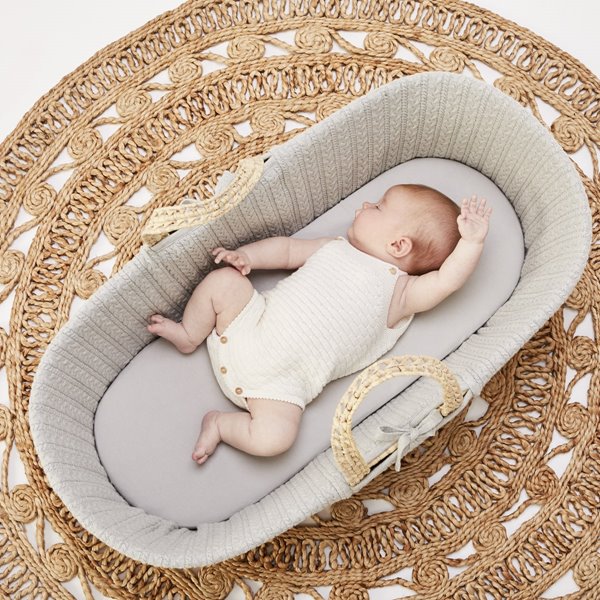
The Little Green Sheep recommends that babies are moved from their Moses basket to a cot when they reach the age of 6 months old or when they can sit up unaided.
When your newborn reaches this age, they'll need extra room for their little arms and legs to stretch out – you don't want them to feel restricted or squashed; it's so important they have the space to grow happily and healthily.
Not only that, but your baby will be getting heavier (as sad as it is to think about them growing up so quickly), and a Moses basket won't be able to safely support their weight as they grow. Our Moses baskets are safe for babies weights up to 9kg, and anything over this wouldn't be safe to use.
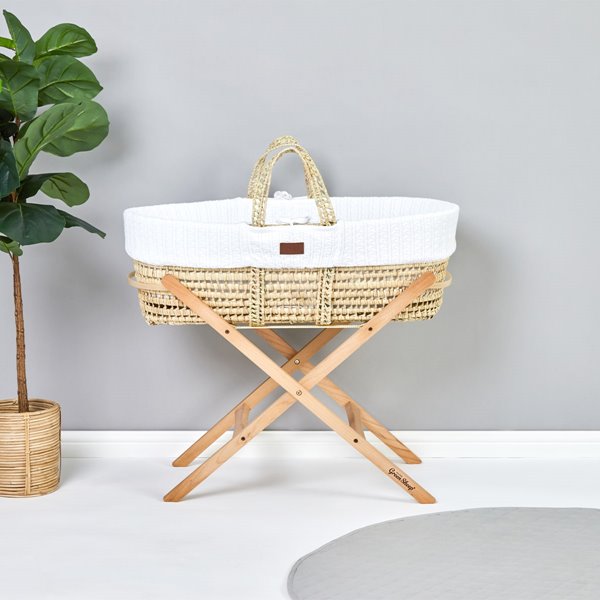
Assuming your baby has reached 6 months of age and can sit up unaided, now is the time to transition them from their Moses basket to a cot.
It's a big change for them, so it might be a bit of an adjustment period as they get used to the new sleeping environment. They might very well welcome the change with open arms, or they might take a little while to settle into their new sleeping arrangement.
The best way to transition your baby to a crib (or cot) is to do it gradually and make the transition as smooth as possible. Begin by setting up their cot in the same room they're used to sleeping in – this way, they'll still be able to recognise their sleep environment.
You can also line the base of the cot with some bedding from their Moses basket; the scent of something familiar will help to settle them into their new sleeping arrangement. If you do this, it's very important that you tuck in any edges of bedding so they don't come loose and get in the way of your baby's sleep.
Once you've done all this, it's time to start spending a little bit of time in their cot during the day. This way, your baby will start to get used to it and won't be so hesitant when it comes to bedtime. After taking a few days to adjust, your baby should be settled into their new sleeping routine in no time at all.
As previously mentioned, The Little Green Sheep recommends that babies are moved from their Moses basket to a cot when they reach the age of 6 months old or when they can sit up unaided. This is the safest age to transition your little one to their cot, as anything after this time would be unsafe.
The maximum weight of a Moses basket is 9kg, so it's important to keep an eye on your little one's weight and know when it's time to make the transition.
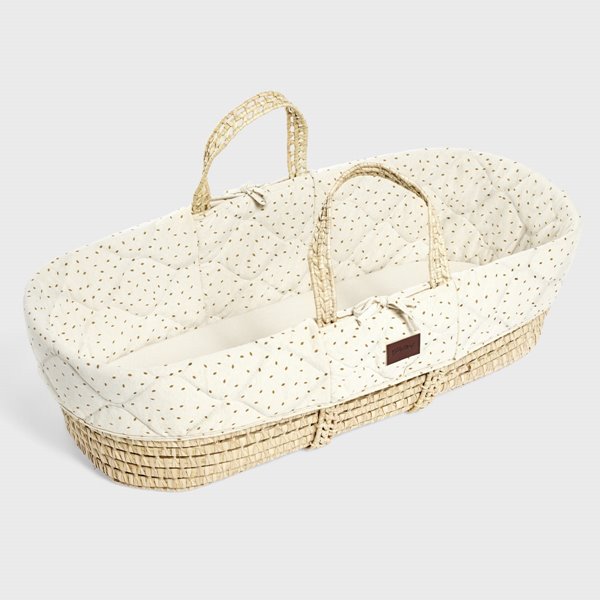
This is one we're all too familiar with, as it's a common question asked by parents, and it's quite tricky to give a comprehensive answer. There can be many reasons why your baby is giving you a difficult time when it comes to bedtime, but some of the most common are:
This list is by no means exhaustive, and if you're really having trouble getting your newborn to settle, we recommend contacting a health professional or sleep expert who can support you further.
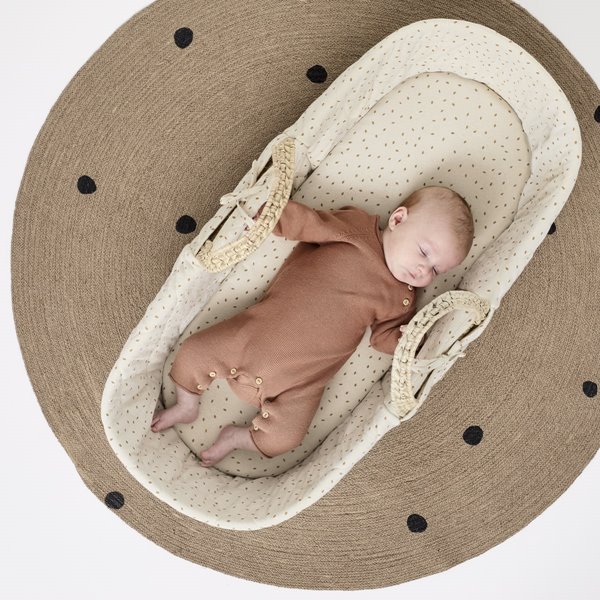
For parents who might have never used or even seen a Moses basket before, you'll need to know what goes into it for your little one to sleep peacefully.
Your Moses basket should have a mattress topped with a mattress protector and fitted sheet. You'll also need a basket liner to act as a soft fabric barrier between your baby's skin and the Moses basket itself.
And finally, a baby sleeping bag to help keep your baby warm and cosy throughout the night.
Your baby's nursery (or your own room if your baby is sharing with you) should be kept at a comfortable temperature, between 16 and 20°C. It's important to keep this temperature consistent for newborn babies' sleep because they can't regulate their body temperature fully until they are around 12 months old.
They are very sensitive to changes in temperature, so it's essential that you check their temperature frequently. This means knowing the signs of your little one being too hot or too cold in their sleep environment.
Signs your baby is too cold include:
Signs your baby is too hot include:
Again, if you're concerned at any point, we recommend getting in touch with a health professional or sleep expert who can advise you further.
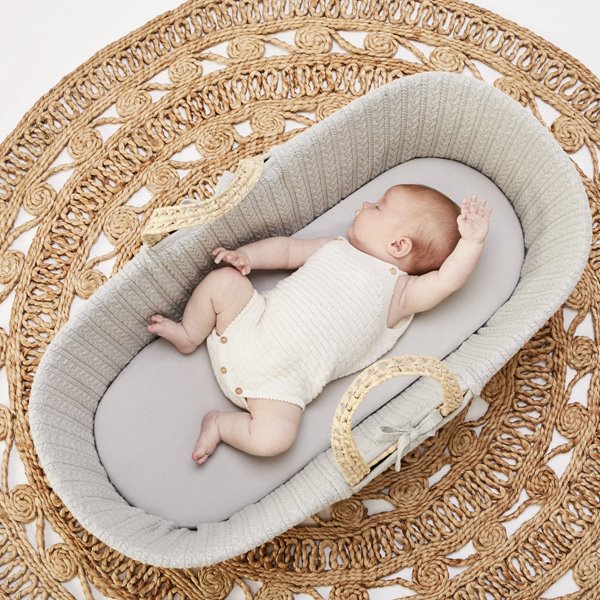
It's always best to keep your baby's sleep environment as simple as possible. Blankets are typically a no-no for babies under 12 months old because they increase the risk of SIDS. But when it comes to toddlers and older children, that's when you can start adding blankets to the mix, so long as you're doing it safely.
Keep the edges of the blanket tightly tucked into the edges of their cot bed, making sure they won't be able to come loose during the night. Blankets should be light and breathable, such as cotton or wool, so your child is still able to regulate their own body temperature.
It's also important to keep in mind that toddlers and young children shouldn't be sleeping with too many blankets – one is more than enough.
Also, try not to leave your child sleeping unattended for long periods of time if they are using blankets. Keeping an eye on them is the best way to ensure their safety.
As experts in Moses baskets, this is something we get asked a lot. And our answer is yes – Moses baskets are perfectly safe for your baby to sleep in.
Not only that, but a Moses basket is a great way to introduce your little one to their sleep environment and make the transition from womb-like surroundings to a sleepy crib much easier.
Our palm leaf Moses baskets are made with natural, organic materials and have been crafted to be breathable, lightweight and soft against your baby's delicate skin. They also come with a sturdy stand that is designed to be extra stable and secure.
Of course, always keep in line with safety guidelines and recommendations, as we discussed at the beginning of this post.
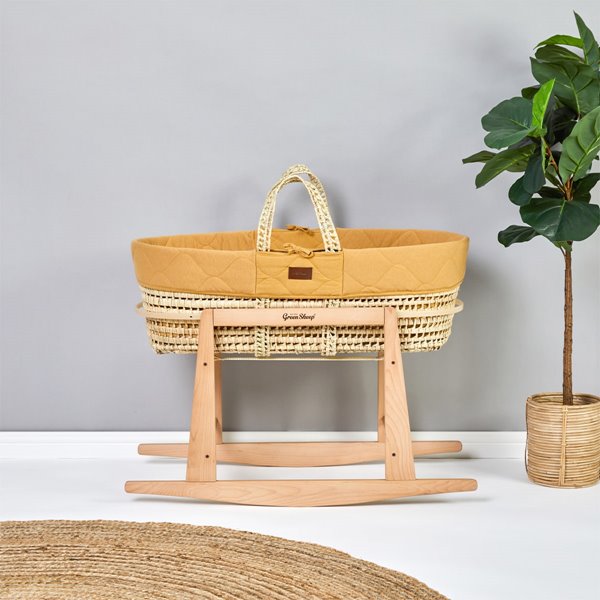
We understand that being a parent is never easy, and the topic of sleep is one that can be especially difficult to navigate. But that doesn't make it impossible!
If you have any further questions about your baby's sleep environment or setting them up for peaceful slumbers, then please don't hesitate to get in touch with us. Our team of baby sleep experts at The Little Green Sheep can give you advice on all our products and setting up your baby's space for sleep success.
With a little helping hand, we can make your life as a new parent just that little bit easier!
The Little Green Sheep recommends that babies are moved from their Moses basket to a cot when they reach the age of 6 months old, or when they can sit up unaided.
Your baby can definitely sleep in a cot during those first few weeks of life. However, we always recommend a Moses basket for their first 6 months to emulate the safety and comfort they experienced in the womb, making their transition into your home sweeter and more enjoyable.
When your newborn reaches 6 months of age and can sit up unaided, it's time to move them from their Moses basket to a cot. You'll also need to keep an eye on their weight, as anything over 9kg would be unsafe in their basket.
For your baby's Moses basket, you'll want the following bedding:
• Mattress and mattress protector
• Fitted sheets
• Moses basket liner
• Baby sleeping bag
Make sure to choose bedding items made from natural, breathable materials that are soft against your baby's delicate skin.